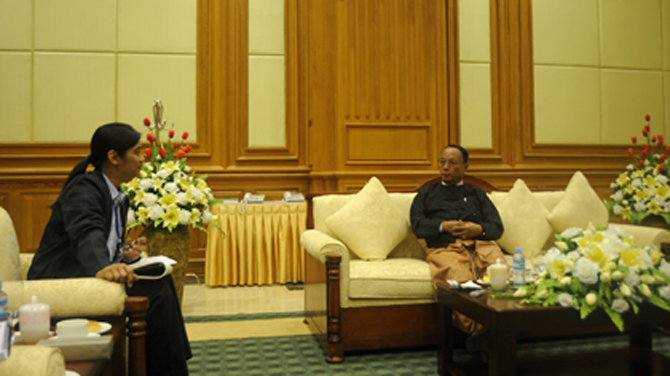NAYPYIDAW— Fighting rampant corruption is the most important issue facing Burma today, said Upper House Speaker Khin Aung Myint in an exclusive interview with The Irrawaddy.
The ex-minister for culture said that existing anti-corruption legislation is out-of date and proposed amendments had already been approved by the Lower House, and would be submitted to the Union Parliament during the next session.
Six key ministries under the former military junta, all of which led by prominent members of the current administration, were accused of misusing billions of kyat in state funds in a government audit report released to members of Burma's Lower House of Parliament at the beginning of March.
Khin Aung Myint revealed that he has approved the Public Accounts Committee of Parliament to investigate how ministries spend their budgets, and the legislature will urge the government to take action where needed.
During an one-hour interview with The Irrawaddy founder Aung Zaw, the 67-year-old speaker also talked about the latest session of Parliament and related issues including military spending, an insider's viewpoint on the National Defense and Security Council and his attitude towards Burmese democracy leader Aung San Suu Kyi.
He said that should the Nobel Peace Prize laureate join Parliament, it would be her decision whether to remain an MP or join a parliamentary committee.
“She's a knowledgeable and educated person with both a good international as well as national image. If she's in the Parliament, our capacity will increase and new ideas will come out. But how she will participate is up to her,” said Khin Aung Myint on Friday after the end of the third session of Parliament.
The speaker admitted that the legislature's third session, which began in January, was overwhelmed by the budget plan for the next fiscal year. He admitted that the budget allocation for military spending is still high at 16 percent, but claimed it was relatively low in comparison with other countries' spending and that both Houses of Parliament approved the allocation.
And the former Major-General denied reports that the Parliament was always going to rubber-stamp military spending as the institution was heavily dominated by army officers and the military-dominated Union Solidarity and Development Party (USDP), by saying that the budget session would not have taken so long if the assembly really was so biased.
“The military took only 25 percent of the seats and it doesn't make a great difference in voting,” he said. “They even said 'yes' to the amnesty for the political prisoners. What all MPs did is for the interests of the country.”
He added that the fledgling Parliament has recently become more active and dynamic than during earlier sessions when MPs would only discuss the needs of their constituencies. “Now we have more focus on policies, and are trying to implement our motto: 'the people's voice is our voice,' as well.”
As a member of the National Defense and Security Council—an 11-member government body with the power to declare states of emergency and appoint the commander-in-chief of defense services—the Upper House Speaker said that even although the council is approved by the Constitution, it cannot be involved in every issue of state affairs. Asked if there was a split between hard and softliners in the council, he answered “no division” with a laugh.
When Suu Kyi visited the Parliament last week, Khin Aung Myint told her not to be worried about the small presence of opposition seats. “I told her we would all support anything that would be good for the country and people,” he said.
When asked whether there had been any recent change in his attitude towards Suu Kyi, the former Major-General replied it would be wrong to think so.
“If we regard General Aung San [the independence hero who founded the Burmese Army and was Suu Kyi's father] as our father, Daw Aung San Suu Kyi is our sister. I have never badmouthed her. I see her as my sister,” he added.

